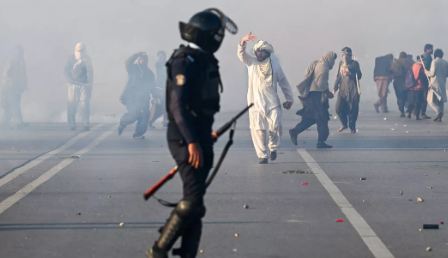The establishment’s role, as always, looms large. Army Chief Field Marshal Asim Munir’s recent remarks suggesting Khan should “apologize and sit silently” have sparked backlash from PTI’s base, reinforcing the perception of a civil-military tug-of-war.
Ansar Mamood Bhatti
ISLAMABAD: As Pakistan’s political landscape enters a turbulent phase, the ruling Pakistan Muslim League-Nawaz (PML-N) finds itself navigating a storm of internal and external pressures. With the government having completed over two years in office, the natural lifespan of a political administration—often considered to be around two and a half years in Pakistan’s volatile environment—is approaching its critical threshold. Historically, this juncture marks the beginning of heightened scrutiny, shifting alliances, and intensified opposition activity. This time is no different.
The PML-N-led coalition, which came to power following the ouster of Imran Khan in April 2022, is now facing mounting challenges. Reports suggest that relations between the PML-N and the establishment are fraying, with tensions simmering beneath the surface. While both sides have publicly maintained a façade of cooperation, insiders hint at growing mistrust over governance decisions, provincial autonomy, and the handling of national crises. The Pakistan Peoples Party (PPP), a key coalition partner, has already voiced its dissatisfaction, warning that continued sidelining could jeopardize the alliance altogether.
Adding fuel to the fire is the recent Supreme Court decision granting post-arrest bail to former Prime Minister Imran Khan in eight cases related to the May 9 riots. Though Khan remains incarcerated due to his conviction in the Al-Qadir Trust case, the bail ruling has reinvigorated his supporters and emboldened the Pakistan Tehreek-e-Insaf (PTI) to reassert its political relevance.
Khan’s partial legal reprieve is likely to increase pressure on the PML-N government, both in terms of public perception and political maneuvering. With by-elections looming in several constituencies following the disqualification of PTI lawmakers, the opposition is expected to capitalize on the moment to galvanize support. The PML-N and PPP have announced a joint strategy to contest these by-polls, signaling an attempt to consolidate their position amid growing instability3.
However, the alliance’s unity remains fragile. PPP leaders have repeatedly criticized the federal government for unilateral decision-making and failure to consult on key issues such as maritime governance and flood rehabilitation efforts. These grievances, if left unresolved, could lead to a rupture in the coalition, further complicating the political equation.
The establishment’s role, as always, looms large. Army Chief Field Marshal Asim Munir’s recent remarks suggesting Khan should “apologize and sit silently” have sparked backlash from PTI’s base, reinforcing the perception of a civil-military tug-of-war. As the political temperature rises, the establishment may find itself recalibrating its stance, especially if public sentiment begins to shift.
In sum, Pakistan’s political weather is heating up rapidly. With the PML-N government nearing the end of its natural political cycle, opposition forces gaining momentum, and coalition partners growing restless, the coming months promise to be anything but calm. Whether the government can weather the storm or be swept away by it remains to be seen—but one thing is certain: the pressure is mounting.

















